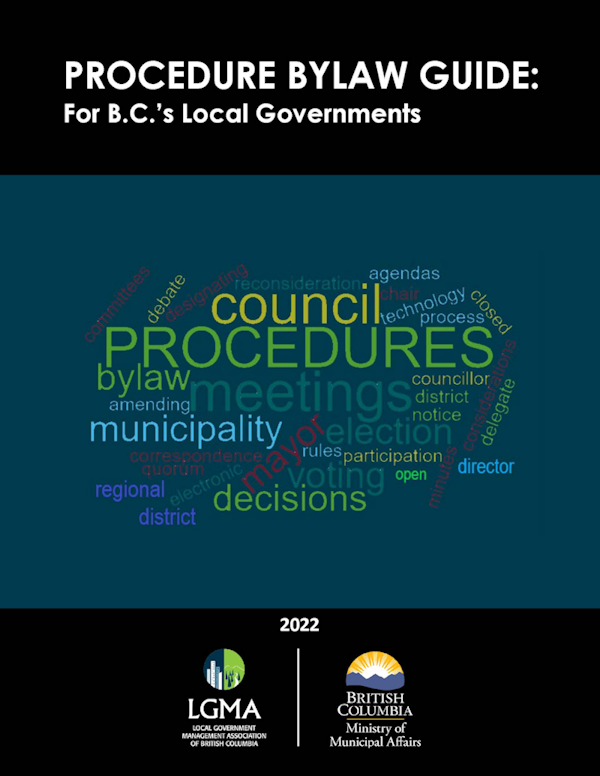Regional district procedure bylaw
Regional district boards must establish procedures for the conduct of their meetings and for the general conduct of their business. These procedures are contained in a procedure bylaw.
A regional district board must adopt a procedure bylaw to:
- Establish rules of procedure for board meetings, including how resolutions may be passed and bylaws adopted
- Establish rules of procedure for board committee meetings
- Provide for giving advance public notice of board and board committee meetings
- Identify places to post public notices issued by the regional district
A board may include other matters in a procedure bylaw, provided they do not conflict with other procedures or requirements contained in other parts of the Local Government Act and other legislation.
Director notice
In keeping with the principles of openness and accountability, a board must not amend, repeal or replace its procedure bylaw without first giving public notice of the intended changes. The notice must describe the proposed changes in general terms and be posted in the regional district’s public notice posting place(s) and published in accordance with section 94 of the Community Charter.
Robert's Rules of Order
Boards also use Robert's Rules of Order to conduct their meetings and make decisions as a group.
Robert's Rules of Order differ from the meeting procedure requirements in the procedure bylaw because these rules are not legislated, but rather commonly agreed upon rules and customs for deliberation and debate.
For example, Robert's Rules of Order outline the order in which to conduct business (for example, call to order, roll call, reading of minutes) and the way to introduce a motion to the table and to put the motion to a vote. Using these rules encourages all board members to use the same language and participate in deliberation and debate in the same manner, which helps to keep meetings orderly and efficient.
Commissions and other bodies
When a regional district board creates a commission or other body, it can determine whether to apply existing board meeting procedures from the procedure bylaw or to design specific procedures for those bodies. In most cases, applying existing board meeting procedures will be the simplest approach. There may be reasons for the board to establish customized rules of procedure in a separate bylaw, for example:
- In some communities there may be advantages to establishing rules for a staff member other than the regional district corporate officer to have overall responsibility for commission meeting minutes
- It may be appropriate to establish procedures that allow any member of the board to participate in discussions and debates (but not vote) in a commission meeting.
Electronic meeting procedures
A regional district board has the authority to conduct regular, special and committee meetings electronically, and to allow board and committee members to participate electronically in their respective meetings. In order to exercise these powers, the board would establish specific rules of procedure in its procedure bylaw and meet the requirements under the Regional District Electronic Meetings Regulation.
Other Procedures
A regional district board may choose to establish rules of procedure on any other matter it considers important. For example:
- Meeting management (for example, applying Robert's Rules of Order)
- Delegations appearing before the board
- Practice of reading an invocation at the start of meeting (subject to Canadian Charter of Rights and Freedoms considerations)
- Expulsion of persons from a meeting (as authorized by the Community Charter)
- Seating arrangements at meetings
- Role of regional district officers and staff at meetings
- Dress codes
- Limitations on the rights of members during discussions and debates
- Time limits for the meeting
- Questions from the public and media
- Use of various recording media, including television and social media
- Civil discourse and appropriate language
- Making referrals and recommendations
- Reports from subsidiary bodies
- Receipt and discussion of new business
- Receipt and reporting of correspondence
Learn more about regional district procedure bylaws.
Related links
Contact information
Contact us if you have questions about regional district procedure bylaw.
250 387-4020
1 800 663-7867

